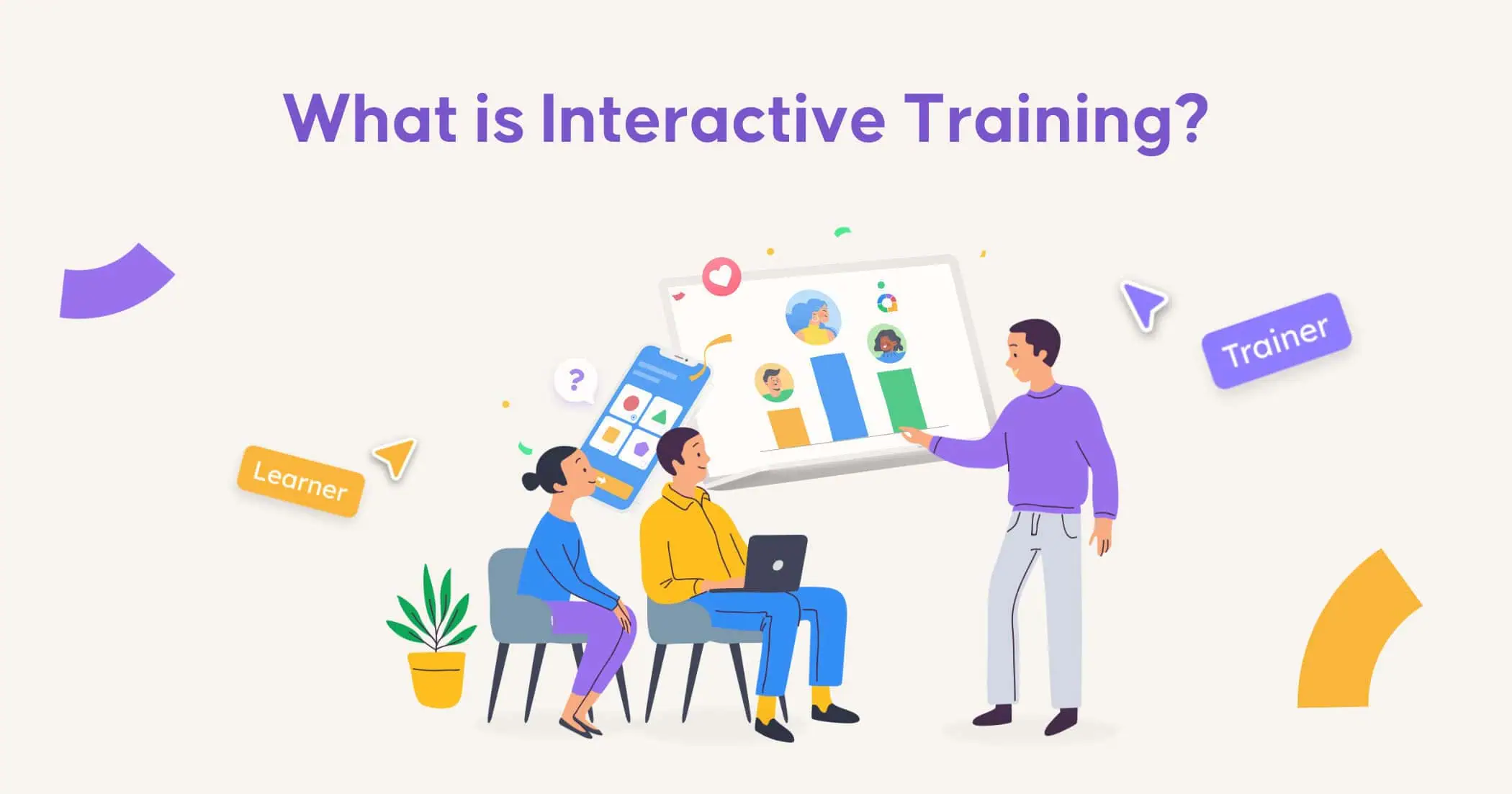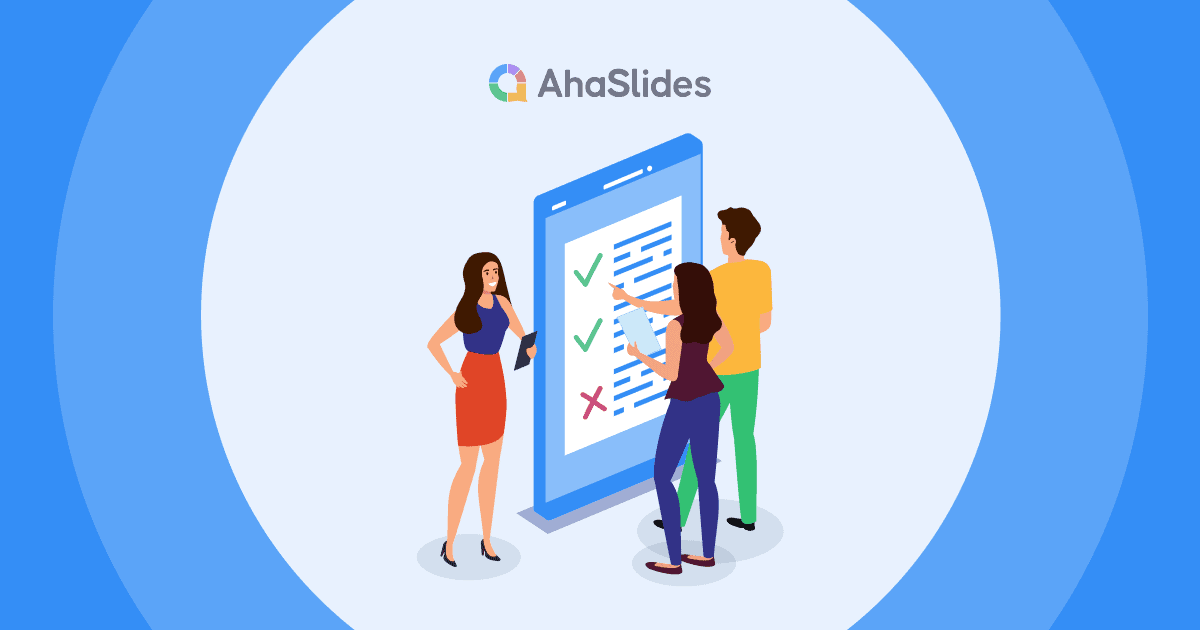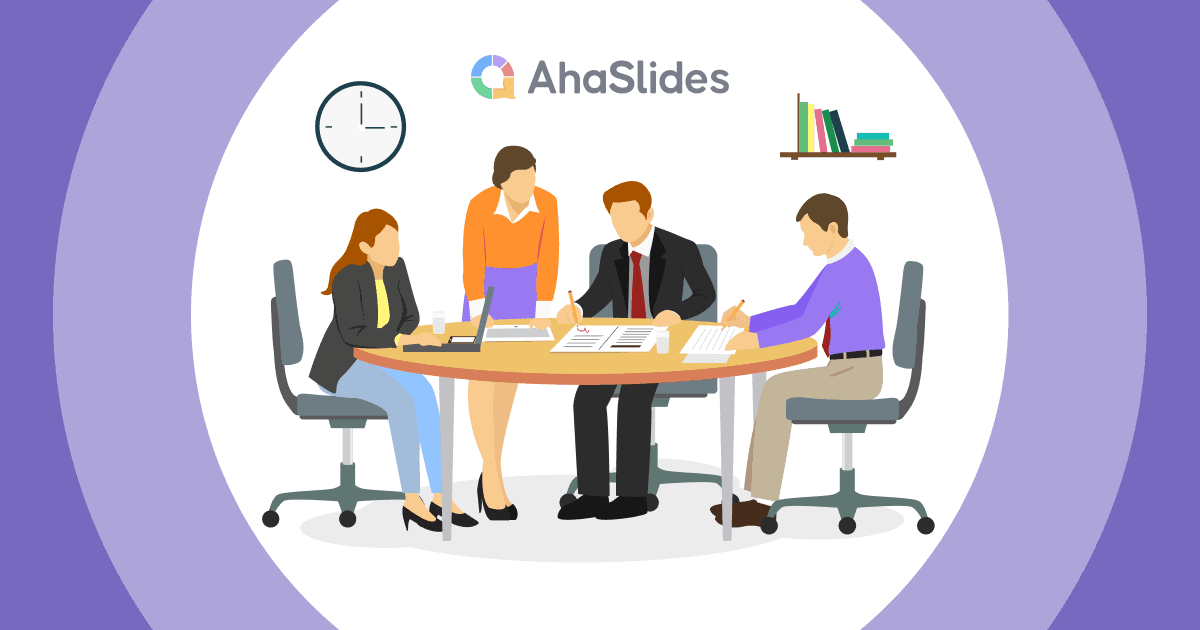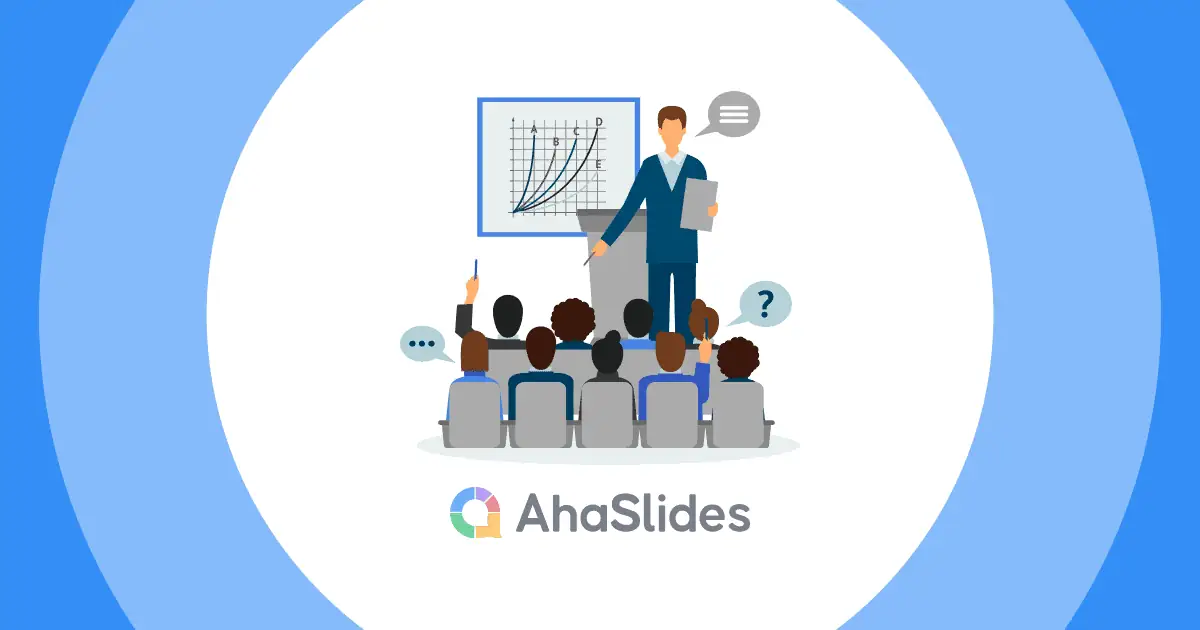Silence fills the virtual meeting room. Camera-fatigued faces stare blankly at screens. Energy flatlines during the training session. Your team gathering feels more like a chore than a connection opportunity.
Sound familiar? You're witnessing the engagement crisis that plagues modern workplaces. Research from Gallup reveals that only 23% of employees worldwide feel engaged at work, and poorly facilitated meetings are a major contributor to this disengagement.
This comprehensive guide provides curated interesting questions to ask, designed specifically for professional contexts: team building activities, training sessions, meeting icebreakers, conference networking, onboarding programmes, and leadership conversations. You'll learn not just what questions to ask, but when to ask them, how to facilitate responses effectively.

Table of Contents
Understanding Professional Engagement Questions
What Makes a Good Question
Not all questions create engagement. The difference between a question that falls flat and a good question that sparks meaningful connection lies in several key characteristics:
- Open-ended questions invite conversation. Questions that can be answered with a simple "yes" or "no" shut down dialogue before it begins. Compare "Do you enjoy remote work?" with "What aspects of remote work bring out your best performance?" The latter invites reflection, personal perspective, and genuine sharing.
- Great questions demonstrate genuine curiosity. People sense when a question is perfunctory versus authentic. Questions that show you care about the answer—and will actually listen to it—create psychological safety and encourage honest responses.
- Context-appropriate questions respect boundaries. Professional settings require different questions than personal ones. Asking "What's your biggest career aspiration?" works brilliantly in a leadership development workshop but feels invasive during a brief team check-in. The best questions match the relationship depth, setting formality, and time available.
- Progressive questions build gradually. You wouldn't ask deeply personal questions at a first meeting. Similarly, professional engagement follows a natural progression from surface-level ("What's your favourite way to start the day?") to moderate depth ("What work accomplishment are you most proud of this year?") to deeper connection ("What challenge are you currently navigating that you'd welcome support with?").
- Inclusive questions welcome diverse responses. Questions that assume shared experiences ("What did you do over the Christmas holiday?") can inadvertently exclude team members from different cultural backgrounds. The strongest questions invite everyone's unique perspective without presuming similarity.
Quick-Start Icebreaker Questions
These questions work perfectly for meeting warmups, initial introductions, and light team connection. Most can be answered in 30-60 seconds, making them ideal for rounds where everyone shares briefly. Use these to break the ice, energise virtual meetings, or transition groups into more focused work.
Work preferences & styles
- Are you a morning person or a night owl, and how does that affect your ideal work schedule?
- Coffee, tea, or something else entirely to fuel your work day?
- Do you prefer working with background music, complete silence, or ambient noise?
- When you're problem-solving, do you prefer to think aloud with others or process independently first?
- What's one small thing that happens during your workday that always makes you smile?
- Are you someone who plans your entire day or prefers to go with the flow?
- Do you prefer written communication or hopping on a quick call?
- What's your favourite way to celebrate a completed project or milestone?
Creative "Would You Rather" for teams
- Would you rather attend every meeting as a phone call or every meeting via video?
- Would you rather have a four-day work week with longer days or a five-day week with shorter days?
- Would you rather work from a coffee shop or from home?
- Would you rather give a presentation to 200 people or write a 50-page report?
- Would you rather have unlimited holidays but lower salary or higher salary with standard holidays?
- Would you rather always work on new projects or perfect existing ones?
- Would you rather start work at 6am and finish at 2pm or start at 11am and finish at 7pm?
Safe personal interest questions
- What's a hobby or interest you have that might surprise your colleagues?
- What's the best book, podcast, or article you've encountered recently?
- If you could master any skill instantly, what would you choose?
- What's your favourite way to spend a day off?
- What's a place you've travelled to that exceeded your expectations?
- What's something you're currently learning or trying to improve at?
- What's your go-to meal when you can't be bothered to cook?
- What's a small luxury that makes your life significantly better?
Remote work & hybrid team questions
- What's the best thing about your current workspace setup?
- What's one item in your workspace that sparks joy or holds special meaning?
- On a scale of 1-10, how excited are you when your video call connects on the first try?
- What's your strategy for separating work time from personal time when working from home?
- What's something unexpected you've learned about yourself while working remotely?
- If you could improve one thing about virtual meetings, what would it be?
- What's your favourite virtual background or screensaver?
Quick Poll-style questions from AhaSlides
- Which emoji best represents your current mood?
- What percentage of your day-to-day has been spent in meetings?
- On a scale of 1-10, how energised do you feel right now?
- What's your preferred meeting length: 15, 30, 45, or 60 minutes?
- How many cups of coffee/tea have you had today?
- What's your ideal team size for collaborative projects?
- Which app do you check first when you wake up?
- What time of day are you most productive?
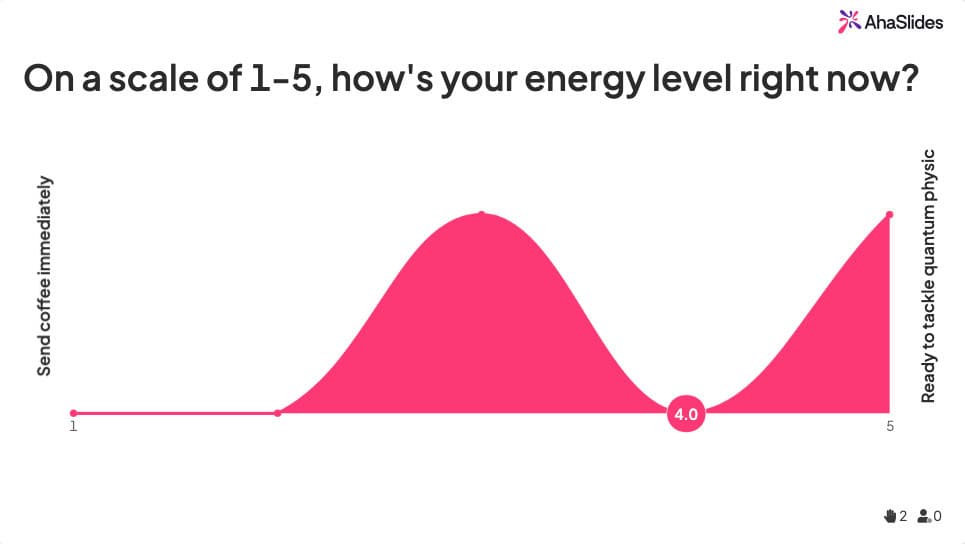
Use these questions with AhaSlides' live polling feature to collect responses instantly and display results in real-time. Perfect for energising the start of any meeting or training session.
Training & Workshop Engagement Questions
These interesting questions to ask help trainers facilitate learning, assess understanding, encourage reflection, and maintain energy throughout sessions. Use these strategically throughout workshops to transform passive content consumption into active learning experiences.
Pre-training needs assessment
- What's one specific challenge you're hoping this training will help you solve?
- On a scale of 1-10, how familiar are you with today's topic before we begin?
- What's one question you're hoping will be answered by the end of this session?
- What would make this training time incredibly valuable for you?
- What learning style works best for you—visual, hands-on, discussion-based, or a mix?
- What's one thing you're already doing well related to today's topic?
- What concerns or hesitations do you have about implementing what we'll learn today?
Knowledge check questions
- Can someone summarise the key point we just covered in their own words?
- How does this concept connect to something we discussed earlier?
- What questions are coming up for you about this framework?
- Where might you see this principle applied in your daily work?
- What's one "aha moment" you've had so far in this session?
- What part of this content challenges your current thinking?
- Can you think of an example from your experience that illustrates this concept?
Reflection & application questions
- How might you apply this concept to a current project or challenge?
- What would need to change in your workplace to implement this effectively?
- What obstacles might prevent you from using this approach?
- If you could implement just one thing from today's session, what would it be?
- Who else in your organisation should learn about this concept?
- What's one action you'll take in the next week based on what you've learned?
- How will you measure whether this approach is working for you?
- What support would you need to successfully implement this?
Energy boost questions
- Stand up and stretch—what's one word that describes your energy level right now?
- On a scale from "need a nap" to "ready to conquer the world," where's your energy?
- What's one thing you've learned today that surprised you?
- If this training had a theme song, what would it be?
- What's the most useful takeaway so far?
- Quick show of hands—who's tried something similar to what we just discussed?
- What's been your favourite part of the session so far?
Closing & commitment questions
- What's the most important insight you're taking away from today?
- What's one behaviour you'll start doing differently based on today's learning?
- On a scale of 1-10, how confident do you feel applying what we've covered?
- What accountability or follow-up would help you implement what you've learned?
- What question are you still sitting with as we close?
- How will you share what you've learned with your team?
- What resources would support your continued learning on this topic?
- If we reconvened in 30 days, what would success look like?
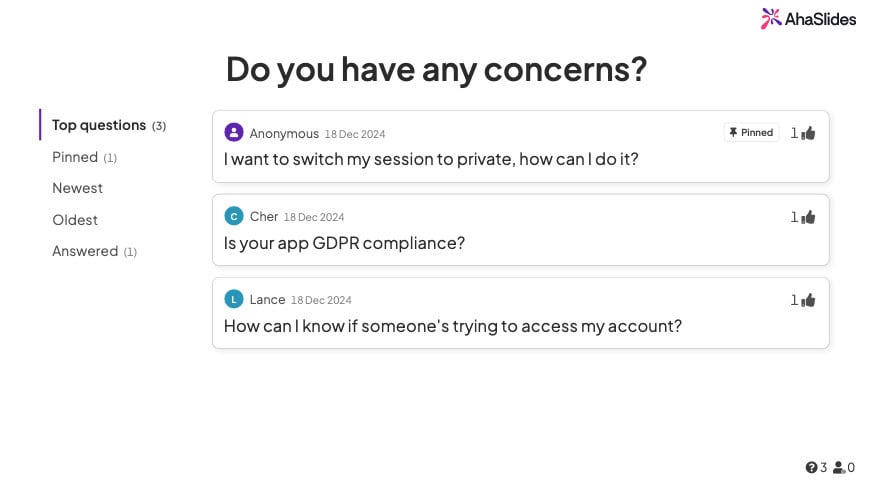
Trainer tip: Use AhaSlides' Q&A feature to collect questions anonymously throughout your session. This reduces the intimidation factor of asking questions in front of peers and ensures you address the room's most pressing concerns. Display the most popular questions and answer them during designated Q&A time.
Deep Connection Questions for Leadership
These interesting questions to ask work best in one-on-one settings, small group discussions, or team retreats where psychological safety has been established. Use these as a manager conducting developmental conversations, a mentor supporting growth, or a team leader strengthening relationships. Never force responses—always offer opt-out options for questions that feel too personal.
Career development & aspirations
- What professional accomplishment would make you feel incredibly proud in five years?
- What aspects of your role energise you most, and which drain you?
- If you could redesign your role, what would you change?
- What skill development would unlock your next level of impact?
- What's a stretch assignment or opportunity you'd like to pursue?
- How do you define career success for yourself—not what others expect, but what truly matters to you?
- What's holding you back from pursuing a goal you're interested in?
- If you could solve one big problem in our field, what would it be?
Workplace challenges
- What's a challenge you're currently navigating that you'd welcome input on?
- What makes you feel most stressed or overwhelmed at work?
- What barriers are preventing you from doing your best work?
- What's something you find frustrating that might be easy to fix?
- If you could change one thing about how we work together, what would it be?
- What support would make the biggest difference for you right now?
- What's something you've been hesitant to bring up but think is important?
Feedback & growth
- What type of feedback is most helpful for you?
- What's one area where you'd welcome coaching or development?
- How do you know when you've done good work?
- What feedback have you received that significantly changed your perspective?
- What's something you're working to improve that I might not be aware of?
- How can I better support your growth and development?
- What would you like more recognition for?
Work-life integration
- How are you genuinely doing—beyond the standard "fine"?
- What does sustainable pace look like for you?
- What boundaries do you need to protect to maintain well-being?
- What recharges you outside of work?
- How can we better honour your life outside of work?
- What's something going on in your life that's affecting your work focus?
- What would better work-life integration look like for you?
Values & motivation
- What makes work feel meaningful to you?
- What were you doing the last time you felt truly engaged and energised at work?
- What values are most important to you in a work environment?
- What legacy do you want to leave in this role?
- What impact do you most want to have through your work?
- When do you feel most authentically yourself at work?
- What motivates you more—recognition, autonomy, challenge, collaboration, or something else?
Important note for managers: While these questions create powerful conversations, they're inappropriate for use with AhaSlides or in group settings. The vulnerability they invite requires privacy and psychological safety. Save interactive polling for lighter questions and reserve deeper questions for one-on-one discussions.
Conference & Event Networking Questions
These questions help professionals connect quickly at industry events, conferences, workshops, and networking sessions. They're designed to move past generic small talk while remaining appropriate for new professional acquaintances. Use these to identify common ground, explore collaboration opportunities, and create memorable connections.
Industry-Specific Conversation Starters
- What brought you to this event?
- What are you hoping to learn or gain from today's sessions?
- What trends in our industry are you paying closest attention to right now?
- What's the most interesting project you're working on currently?
- What challenge in our field keeps you up at night?
- What recent development or innovation in our industry has excited you?
- Who else at this event should we make sure to connect with?
- What session are you most looking forward to today?
Professional Interest Questions
- How did you get into this field originally?
- What aspect of your work are you most passionate about?
- What's something you're currently learning or exploring professionally?
- If you could attend any other conference besides this one, which would you choose?
- What's the best professional advice you've received?
- What book, podcast, or resource has influenced your work recently?
- What skill are you actively working to develop?
Learning & Development Questions
- What's the most valuable thing you've learned at this event so far?
- How do you stay current with developments in your field?
- What's a recent "aha moment" you've had professionally?
- What's one insight from today you're planning to implement?
- Who in our industry do you follow or learn from?
- What professional community or group do you find most valuable?
Collaboration Exploration
- What type of collaboration would be most valuable for your work right now?
- What challenges are you facing that others here might have insights on?
- What resources or connections would be helpful for your current projects?
- How can people here best stay in touch with you after the event?
- What's an area where you could use an introduction or connection?
For event organisers: Use AhaSlides to facilitate speed networking rounds. Display a question, give pairs 3 minutes to discuss, then rotate partners and show a new question. This structure ensures everyone connects with multiple people and always has a conversation starter ready. Collect attendee insights with live polls to create shared talking points that spark organic networking during breaks.
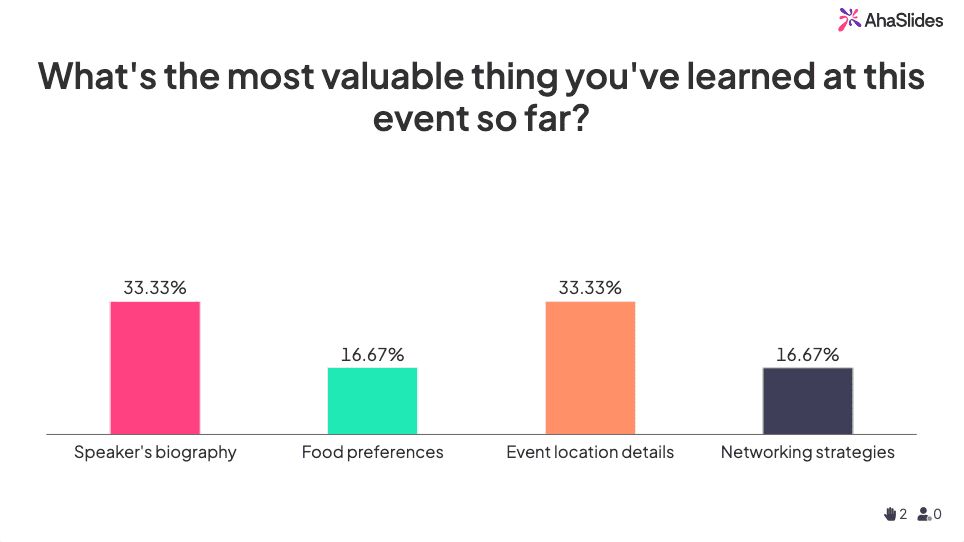
Advanced Question Techniques
Once you're comfortable with basic question implementation, these advanced techniques elevate your facilitation.
The paired question framework
Rather than asking single questions, pair them for depth:
- "What's going well?" + "What could be better?"
- "What are we doing that we should keep doing?" + "What should we start or stop doing?"
- "What's energising you?" + "What's draining you?"
Paired questions provide balanced perspective, surfacing both positive and challenging realities. They prevent conversations from skewing too optimistic or too pessimistic.
Question chains and follow-ups
The initial question opens the door. Follow-up questions deepen exploration:
Initial: "What's a challenge you're currently facing?" Follow-up 1: "What have you already tried to address it?" Follow-up 2: "What might be getting in the way of solving this?" Follow-up 3: "What support would be helpful?"
Each follow-up demonstrates listening and invites deeper reflection. The progression moves from surface-level sharing to meaningful exploration.
Using silence effectively
After asking a question, resist the urge to fill silence immediately. Count to seven silently, allowing processing time. Often the most thoughtful responses come after a pause when someone has truly considered the question.
Silence feels uncomfortable. Facilitators often rush to clarify, rephrase, or answer their own questions. This robs participants of thinking space. Train yourself to be comfortable with five to ten seconds of silence after posing questions.
In virtual settings, silence feels even more awkward. Acknowledge it: "I'm going to give us a moment to think about this" or "Take 20 seconds to consider your response." This frames silence as intentional rather than uncomfortable.
Mirroring and validation techniques
When someone responds to a question, reflect what you've heard before moving on:
Response: "I've been feeling overwhelmed with the pace of change lately." Validation: "The pace is feeling overwhelming—that makes sense given how much has shifted. Thank you for sharing that honestly."
This acknowledgment shows you've listened and that their contribution matters. It encourages continued participation and creates psychological safety for others to share authentically.
Creating question cultures in teams
The most powerful application of questions isn't isolated instances but ongoing cultural practices:
Standing rituals: Begin every team meeting with the same question format. "Rose, thorn, bud" (something going well, something challenging, something you're looking forward to) becomes a predictable opportunity for connection.
Question walls: Create physical or digital spaces where team members can post questions for the team to consider. Address one community question at each meeting.
Question-based retrospectives: After projects, use questions to extract learning: "What worked well that we should repeat?" "What could we improve next time?" "What surprised us?" "What did we learn?"
Rotating question facilitators: Rather than always having the manager pose questions, rotate responsibility. Each week, a different team member brings a question for team discussion. This distributes voice and creates varied perspectives.
Question-first decision making: Before making significant decisions, institute a practice of question rounds. Collect questions about the decision, concerns that should be addressed, and perspectives that haven't been considered. Address these before finalising the choice.
The "Two Truths and a Lie" framework
This playful technique works brilliantly for team building. Each person shares three statements about themselves—two true, one false. The team guesses which is the lie. This creates engagement through game mechanics while surfacing interesting personal facts that build connection.
Professional variation: "Two professional truths and one professional lie"—focusing on career background, skills, or work experiences rather than personal life.
AhaSlides implementation: Create a multiple-choice poll where team members vote on which statement they think is the lie. Reveal results before the person shares the truth.
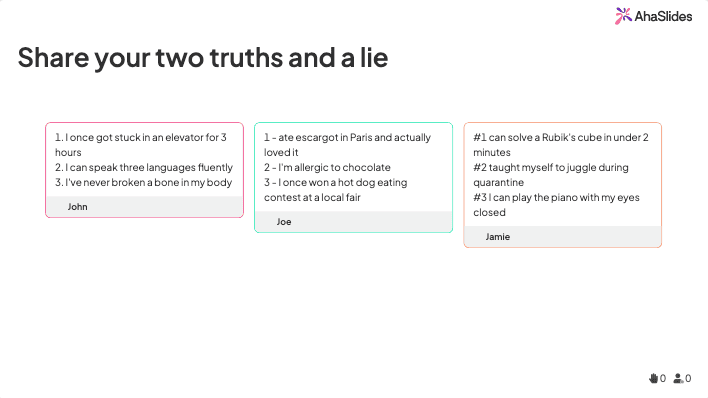
Progressive Disclosure Techniques
Start with questions everyone can answer easily, then gradually invite deeper sharing:
Round 1: "What's your favourite way to start the work day?" (surface-level, easy) Round 2: "What work conditions bring out your best performance?" (moderate depth) Round 3: "What's a challenge you're navigating that you'd welcome support with?" (deeper, optional)
This progression builds psychological safety incrementally. Early questions create comfort. Later questions invite vulnerability only after trust has developed.
Ready to Transform Your Team Engagement?
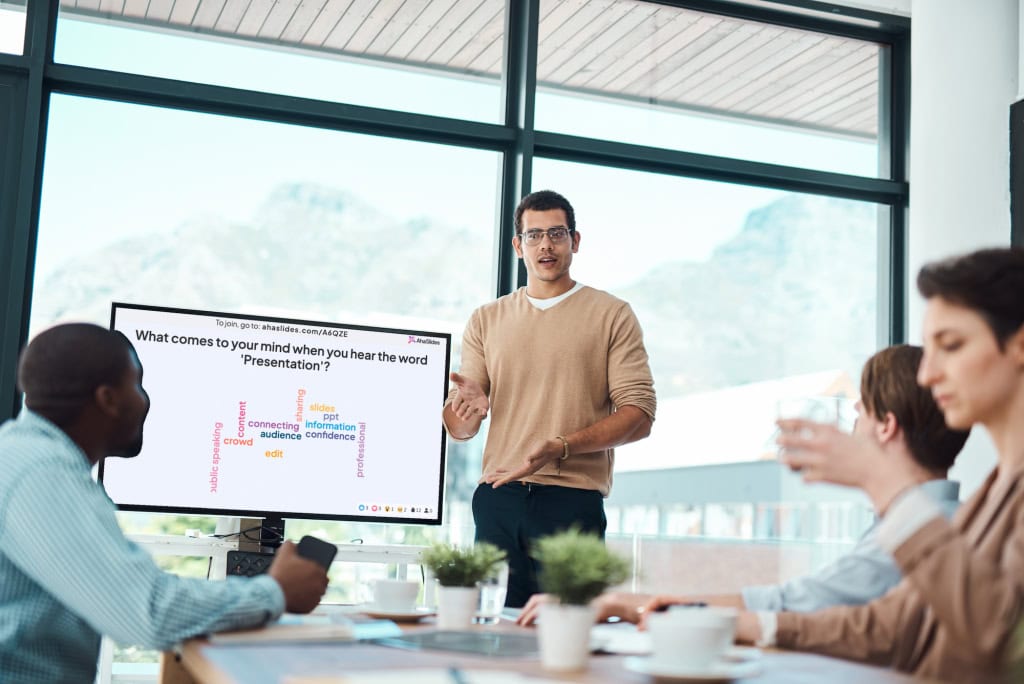
Stop settling for disengaged meetings and passive training sessions. AhaSlides makes it effortless to implement these engagement questions with interactive polls, word clouds, Q&A sessions, and quizzes that bring your team together—whether you're in person or virtual.
Get started in 3 simple steps:
- Browse our pre-built templates - Choose from ready-made question sets for team building, training, meetings, and networking
- Customise your questions - Add your own questions or use our 200+ suggestions directly
- Engage your team - Watch participation soar as everyone contributes simultaneously via any device
Try AhaSlides free today and discover how interactive questions transform sleepy slides into engaging experiences your team actually looks forward to.
Frequently asked questions
How many questions should I use in a typical meeting?
For a one-hour meeting, 2-3 strategic questions typically suffice. One quick icebreaker at the start (2-3 minutes total), one check-in question mid-meeting if energy wanes (2-3 minutes), and potentially one closing reflection question (2-3 minutes). This maintains engagement without dominating meeting time.
Longer sessions allow for more questions. A half-day workshop might include 8-12 questions distributed throughout: opening icebreaker, transition questions between modules, energy-boost questions mid-session, and closing reflection.
Quality matters more than quantity. One well-timed, thoughtfully facilitated question creates more engagement than five rushed questions that feel like boxes to check.
What if people don't want to answer?
Always provide opt-out options. "You're welcome to pass and we can come back to you" or "Share only what feels comfortable" gives people agency. Ironically, explicitly allowing people to opt out often makes them more willing to participate because they feel control rather than pressure.
+ If multiple people consistently pass, reassess your questions. They may be:
+ Too personal for the psychological safety level
+ Poorly timed (wrong context or moment)
+ Unclear or confusing
+ Not relevant to participants
Low participation signals needed adjustment, not participant failure.
How do I make introverts comfortable with question-based activities?
Provide questions in advance when possible, giving introverts processing time. "Next week we'll discuss this question" allows preparation rather than demanding immediate verbal response.
Offer multiple participation modes. Some people prefer speaking; others prefer writing. AhaSlides enables written responses visible to all, giving introverts equal voice without requiring verbal performance.
Use think-pair-share structures. After posing a question, allow individual thinking time (30 seconds), then partner discussion (2 minutes), then full group sharing (selected pairs share out). This progression lets introverts process before contributing.
Never force public sharing. "Feel free to share in the chat instead of verbally" or "Let's collect responses in the poll first, then we'll discuss patterns" reduces pressure.
Can I use these questions in virtual settings effectively?
Absolutely—in fact, strategic questions matter even more virtually. Screen fatigue reduces engagement, making interactive elements essential. Questions combat Zoom exhaustion by:
+ Breaking up passive listening with active participation
+ Creating variety in interaction modes
+ Giving people something to do beyond staring at screens
+ Building connection despite physical distance
How do I handle awkward or uncomfortable responses to questions?
Validate first: "Thank you for sharing that honestly" acknowledges the courage to contribute, even if the response was unexpected.
Redirect gently if needed: If someone shares something wildly off-topic or inappropriate, acknowledge their contribution then refocus: "That's interesting—let's keep our focus on [original topic] for this conversation."
Don't force elaboration: If someone seems uncomfortable after answering, don't push for more. "Thank you" and moving on respects their boundary.
Address obvious discomfort: If someone appears upset by their own response or others' reactions, check in privately after the session: "I noticed that question seemed to hit a nerve—are you okay? Is there anything I should know?"
Learn from missteps: If a question consistently produces awkward responses, it's likely poorly matched to the context. Adjust for next time.



